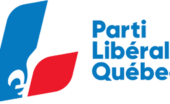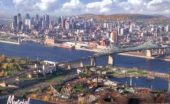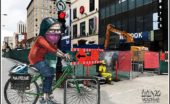Johannah Bernstein post: "eternally proud of my father’s extraordinary aeronautical engineering. legacy. here is a photo of the Canadair Water…
So much to celebrate about living in Montreal
Written by Diana Thebaud Nicholson // June 7, 2014 // Montreal // Comments Off on So much to celebrate about living in Montreal

Photograph by: Megan Martin/Special to The Gazette
There’s so much to celebrate about living in Montreal
If overcoming adversity is the secret to communal happiness, then we’re due an extra helping of joy.
We ask some prominent Montrealers what they love most about our city
MONTREAL — In order to truly appreciate life, a wise friend once told me, one has to suffer a little.
We were descending from the peak of Mt. Algonquin in the Adirondacks after an unexpectedly harrowing five-hour hike through snow and ice that allowed ample time to ponder the question: “Why did we choose to inflict this on ourselves?”
But as we descended, elated, my friend pointed out that it was the hardships we overcame that made the journey so special, and brought our disparate band of hikers closer.
If overcoming adversity and suffering en masse is the secret to communal happiness, then Montrealers are due an extra helping of joy. Just as a sailor trapped in the darkness of a long storm may forget the existence of the sun, many Montrealers swamped by waves of corruption scandals and a particularly nasty political climate have lost sight that they live in one of the greatest and most vibrant cities in the world. One that manages to remain mostly harmonious in spite of, or perhaps because of, its vast diversity.
More tarnished jewel than island paradise, Montreal is all the more precious to those who choose to live here — in part because of its imperfections.
There are signs, finally, that Montrealers are starting to feel that glimmer of warmth again, and with it a rebirth of their pride.
The shift in attitude coincides with the re-emergence of the sun, a glorious Habs playoff run, and Grand Prix weekend, what radio host Terry DiMonte refers to as “the starting gun for the summer.” It’s a time when we see our metropolis through the eyes of outsiders who see it as a special place for its unique French-English mix, harmonious multicultural melding and its expertise in the art of joie-de-vivre.
The Gazette asked a handful of prominent Montrealers what they think makes our metropolis stand out. Alongside these perspectives, today we kick off a Gazette summer series on the many things that make this city a special place to live, from A to Z. We’ll run daily features — one for each letter of the alphabet. [Click for series]
Congratulations, Montrealers, we’ve made it through some dark times. Now, it’s time to celebrate under the sun.
The last many months have been hard on the soul, CHOM morning man Terry DiMonte notes.
“I’ve told family and friends across the country that it has been very difficult to live in Montreal over the past 18 months, even more difficult than normal,” DiMonte said. “I had a French friend who told me, ‘Anglophones love the city so much because they have to fight so hard to stay.’
“When I first came back from Calgary, my first summer was the Maple Spring (season of student protests), which I found incredibly difficult, and that was followed by the election of the Parti Québécois (government) and all the disharmony and divisiveness (that followed), and that I found really, really soul-sapping.”
In his four years in Calgary, DiMonte found that city clean, well-run and “all of those things that Montreal isn’t.” Yet he returned, for there is something about this city’s chaos that attracts.
“As much as I hate to say it, part of what makes Montreal special is it demands a lot of you to live there — the construction, the politics, the closed highways, the potholes, the things we argue about, it’s all of those things that make the place in an odd way a special place. … It gives it a flavour you can’t find in any other city in Canada.”
All that adversity breeds a certain toughness, said Michel Leblanc, president and CEO of the Board of Trade of Metropolitan Montreal. The city has shown resiliency in the face of a slew of crises, including loss of status as Canada’s top business metropolis, the flight of head offices and a decimated manufacturing sector.
“Despite all that, there is an optimism, or will, to develop the city that always comes back,” Leblanc said. “We are an ambitious city. That doesn’t mean we necessarily realize all our ambitions, but when we say Montreal will be a cultural metropolis, and we way Montreal is a city of creativity, we actually create those two Montreals, we project ourselves as an international metropolis.”
After a long decline, Montreal is rebuilding its roads and bridges, and residential and commercial office towers are sprouting everywhere, and especially downtown. There are 86 building projects over $5 million underway in Montreal and its demerged municipalities, Quebec’s construction commission reported this week. That indicates a positive outlook by developers, and the banks that saw fit to finance them, Leblanc said. The challenge, however, will be putting up with 10 years of construction zones.
Beyond the current building boom, Dinu Bumbaru of Heritage Montreal also notes the city’s unique geography.
“What I think is wonderful, somehow, is the space of the city itself,” Bumbaru said. “The architecture is not an architecture of immense landmarks, but one of streetscapes, and the connection between those, in a way. We can have a stroll on Gouin Blvd., or a stroll from the mountain down to the Lachine Canal. It is a strollable city.
“It is the scale of the city, the notion of neighbourhoods and the fact that we have a living core.” (Eighty-four thousand people live in the Ville Marie borough, making for the most populated downtown core in North America after New York City, La Presse reported this week).
While many cities are statistically diverse, their cultural groups are often grouped into ghettos that inhibit interaction and can create tensions. Montreal has a “mixity,” notes Bumbaru, “a porosity in the city fabric” that allows the multitudes to merge.
That coming together creates a unique collectivity among people from all over the globe, says comedian Sugar Sammy.
“People say there are two solitudes — I think there’s actually all these cultures that are starting to meld together,” said Sugar Sammy, whose bilingual standup shows have drawn 235,000 fans in Canada and India over the last two years, and whose new French TV show, Ces gars-là, is drawing a wide anglophone audience. It helps, he notes, that most Montrealers are bilingual, if not trilingual. The easy mixing allows Montrealers, often strongly attached to their own neighbourhoods, to visit the city’s other many varied locales and yet always still feel at home, Sammy said.
“It’s not just biculturalism, but so many cultures and the fact that people know about each other here,” he said. Despite the division caused by Quebec’s proposed charter of values, Montreal’s “mixity” is actually a source of unity, Sammy said. Montreal’s city council and its mayor unanimously defied the charter, and the PQ, which proposed the charter, were trounced in the April elections.
Communications strategist Martine St-Victor describes Montreal’s intermingling as harmony, as opposed to mere “tolerance.”
“Harmony means not only that you have Asian friends, it’s that you love Asian restaurants — that you actively seek out other cultures and make them your own,” she said.
“There is this human contact that you don’t find, for example, in New York or Paris,” she said, in part because many of Montreal’s neighbourhoods, with their local cafés and small cordonneries, maintain their village feel. “You sense you are part of a collective, that we are not just individuals, which is great.” It’s also a city where people aren’t afraid to look one another in the eye.
And the city has a new champion, she said, in Mayor Denis Coderre.
“He’s taking the city where it hasn’t been in a long time because he has guts. He has a big mouth, but he backs it up.”
Since his election in November, Coderre has travelled to municipalities throughout Quebec, and to New York City, Paris, Lyons, and Brussels to forge bonds. And to proclaim: “We’re back.”
“Our role is to make the city known, to make sure we are contagious. We have a great reputation internationally,” Coderre said. “When people come to Montreal, they fall in love with it.”
At home, Coderre’s message has been: Tackle the issues, stop beating ourselves up about past transgressions and gain more power as Quebec’s major metropolis. If city council is proactive and takes decisions, the people will appreciate it, he argues. And they will forgive your mistakes, which allows for progress.
“When we step back and look at ourselves in a bigger way, I think this is one of the greatest places in the world,” Coderre said.
And a city that suffers as one also gets to celebrate as one.
“We have this sort of sense, I think, of going through something together,” Sugar Sammy said. “We live whatever the pulse is, and if you live it together you feel it, and I think it makes you fall in love with the city even more.”
rb*******@*************te.com



